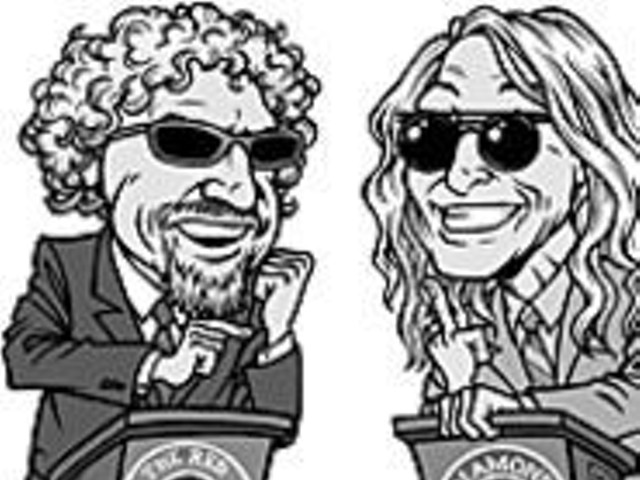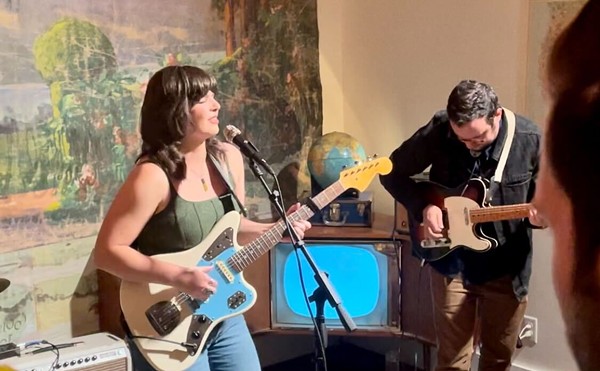In the early '90s, alternative rock exploded thanks to groups like Nirvana and the Smashing Pumpkins, who banished chart-topping hair-farmers Warrant and Slaughter to the county-fair circuit. Lollapalooza became a top summer draw, an opportunity for thousands of shirtless dudes to throw beer cups at Nick Cave and Tricky.
But now the alternative scene looks as dead as Robert Smith does. A slew of new albums released this year by such alt-rock prime movers as Courtney Love, PJ Harvey, Sonic Youth and Morrissey are all on pace to sell little more than 100,000 copies. Those numbers may be fine for Afroman, but for the former vanguard of college rock, they suck wind like Ms. Love chasing down her sanity.
It's even bleaker on the touring front. A few weeks ago, Lollapalooza was canceled owing to poor ticket sales, despite a lineup boasting such seminal acts as Sonic Youth and Wilco. The Cure's Curiosa Fest, whose roster includes college-radio faves Interpol and Mogwai, is reportedly selling fewer than 5,000 tickets in some markets.
Look at the handful of tours that are making money this summer, and it's easy to see why these two bills have failed to live up to expectations. Ozzfest and the Warped Tour are perennially strong draws because they mine a specific culture. The Warped Tour is as short on surprises (NOFX is playing for the fifth freakin' time, the Vandals for the fourth) as it is unpierced nipples. The diversity's no better on Ozzfest, where Black Sabbath is headlining this year for the fourth time.
Lollapalooza 2004 failed because there's no longer a unified alternative culture for the tour to tap into. Granted, the alternative scene has always been much harder to define than metal or punk (what, you don't see the similarities between R.E.M. and Ministry?), but most genres are broad. Cannibal Corpse doesn't sound much like Black Sabbath, but both bands are as metal as Iron Man's schlong. Like headbangers, alternative crowds were once united -- in their universal disregard for conventions of mainstream music and in their sense of adventure.
But once Nirvana topped the charts in 1991, alternative became so big that countless bands clearly outside the scene glommed onto it to boost sales, thus riding the trend to a quick death. Suddenly straight-up rock bands such as Pearl Jam and Alice in Chains were branded "alternative" simply because of the town they hailed from. Really, what was Pearl Jam an alternative to? Foghat?
By the mid-'90s, unchallenging, vanilla-rock bands such as Bush and the Foo Fighters became the new face of alternative rock; consequently, the scene lost its meaning and flatlined. When the world's biggest metal act headlines Lollapalooza, as Metallica did in 1996, you know alternative culture is done for.
Adventurous music still exists, to be sure, but the culture that united it all is long gone. For those weaned on the strange, wonderfully eccentric community that was alternative rock, there's little to identify with these days. Morrissey's friends got more than successful. They got lost. -- Jason Bracelin
Rock the Vote
With John Kerry and John Edwards announcing their partnership earlier this month to the Van Halen ditty "Right Now," we paused to consider the best and worst campaign theme songs of all time (see page 59 for lots more on Van Halen).
Arnold Schwarzenegger had perhaps the rockin'est theme song ever when he chose Twisted Sister's "We're Not Going to Take It!" for his rousing defeat of Gray Davis in last year's California governor recall. In a defying show of hubris, Davis stuck to the Grateful Dead's "Touch of Grey" throughout the campaign. Did he never consider the lyrics when choosing the song in his defense of his financially marred governorship?
I know the rent is in arrears, the dog has not been fed in years
It's even worse than it appears, but it's all right....
Bill Clinton used Fleetwood Mac's "Don't Stop" to win both his presidencies. But when allegations of Clinton's affair with Monica Lewinsky hit the press, Rush Limbaugh and other pundits were quick to replace it with "Devil in a Blue Dress." Sure, Lewinsky was wearing a blue dress during the infamous tryst in the Oval Office, but wasn't the story more about the alleged "stain" on the dress? We suggest, in hindsight, that a much more apropos tune might have been ZZ Top's "Pearl Necklace":
She was gettin' bombed,
And I was gettin' blown away,
And she took it in her hand,
And this is what she had to say:
A pearl necklace.
She wanna pearl necklace.
Bob Dole twisted the lyrics of Sam & Dave's "I'm a Soul Man" during his failed presidential campaign in 1996. "I'm a Dole Man" didn't register with voters, but Dole rose again and is now a spokesman for Viagra -- delivering Elizabeth the sweet Dole meat. His current campaign song should begin and end with Spinal Tap's genius "Big Bottom":
My baby fits me like a flesh tuxedo
I'd like to sink her with my pink torpedo....
Francis Slay also chose F-Mac's ubiquitous "Don't Stop" (perhaps the hardest-working song in politics) for his successful mayoral campaign back in 1999. No word on what Slay has in store for his re-election campaign in '06 but reliable sources say the Reverend Al Sharpton, the RFT-endorsed candidate for mayor, is planning to oust the incumbent with a brass-band version of Public Enemy's "By the Time I Get to Arizona":
For the man who demands respect
'Cause he was great c'mon
I'm on the one mission
To get a politician
To honor or he's a goner
By the time I get to St. Louis.... -- Chad Garrison
Hey, Mr. DJ!
London resident, chef and international superstar DJ Paul Oakenfold is a very busy man. Reached in Los Angeles moments before departing for Detroit, he found time to talk to the little ol' RFT. Here's what he had to say about the Lou, playing out (literally) and the most annoying clubbers ever.
The Riverfront Times: You've been to St. Louis before. What do you know or like about St. Louis?
Paul Oakenfold: I've been there twice very briefly actually. The first time, I did a small club [Velvet], which was really good. The crowd was really up for it and seemed to enjoy themselves, which was good because I had a great time. It was really nice [for] my first time there. I had a little time, so we obviously looked briefly at the Mississippi and the Arch and drove around town. And then the last time I came was with Moby, and we were actually out of town [in Sauget]. We came, performed and then we were on the tour bus and off, so I didn't really have too much time again to have a look around. I do like to kind of see what's going on and kind of get involved as much as possible really.
I know you've worked with a variety of different kinds of artists. You know, hip-hop is really big here in St. Louis. Do you have any plans to work with Nelly, or would you like to work with him?
Oh yeah, Mr. Nelly! I think his music's great. I'm looking forward to both albums.... I think he has a formula that works really well, and he seems really nice, not that I've met him, but he seems really cool. He put St. Louis on the map.
So I have a bunch of recordings of live performances of yours, and it seems like inevitably every time someone's either blowing a disco whistle or the air horn. Do they distract you as you're playing?
[laughs] No, no, no, it's just people enjoying themselves. I mean, that's what it's all about for me. The most important thing in clubs is the people, so if they're having a good time, then hopefully so am I.
Do you like playing outdoors or indoors better? I know you've played a lot of festivals, but clubs too.
There's something about playing outdoors. I'm really looking forward to playing under the Arch. This is a great honor for me to come to St. Louis and do this, so I'm really looking forward to it. -- Alison Sieloff





